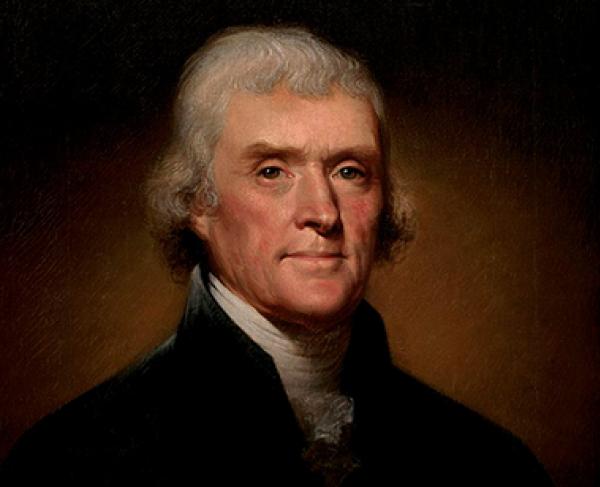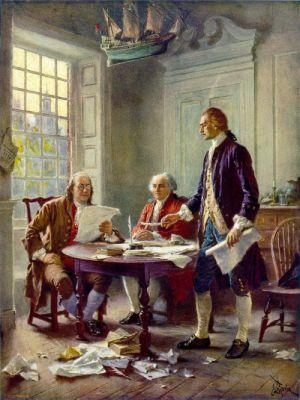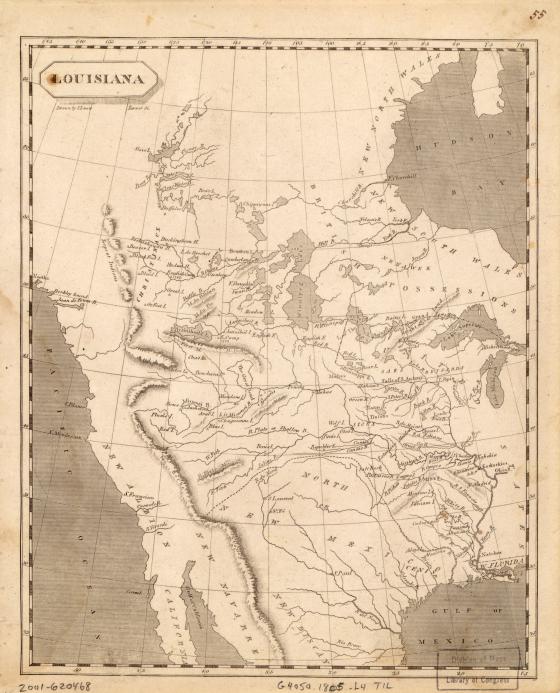Thomas Jefferson

Thomas Jefferson was born in Shadwell in the colony of Virginia on April 13, 1743. Jefferson's father, Peter Jefferson, was self-taught and decided his children would receive a formal education. Peter Jefferson provided private tutors for his son beginning at the age of 5. Though his father died when Jefferson was only fourteen, Jefferson continued his pursuit of education enrolling at the College of William and Mary at age sixteen. At William and Mary, Jefferson studied mathematics, metaphysics, and philosophy. Through these studies, Jefferson was introduced to the philosophers, John Locke and Francis Bacon, whose writings deeply impacted Jefferson's writing on natural rights and governance.
Jefferson began his role as a political activist and revolutionary at a relatively young age. In addition to practicing law, Jefferson was a representative in the Virginia House of Burgesses. During this first role in governance, Jefferson would reveal his revolutionary leanings. After Parliament's passing of the Intolerable Acts in 1774, Jefferson introduced a resolution actively protesting the British crown. Jefferson called for a day-long fast and a boycott of all British Goods. This resolution eventually became Jefferson's A Summary View of the Rights of Man. In which Jefferson raised grievances with King George and Parliaments increased role within the colonies. Jefferson even made an early plea for the sovereignty of the colonies, arguing, "Every society must at all times possess within itself the sovereign powers of legislation."
As Jefferson became prominent in Virginia politics, he also amassed status along with his power. Jefferson inherited the land that would become Monticello after his father’s death, and at twenty-one gained complete control over the 5,000 acres of land and forty slaves. Jefferson later inherited 135 slaves from his father in law, he would own approximately six hundred slaves by his death. This would become the biggest moral and philosophical dissonance of Jefferson’s life, his passion for liberty and enlightenment values while being an active participant in the institution of slavery. Jefferson’s participation in slavery remains controversial today, especially because of the six-hundred slaves Jefferson owned, he only freed seven.

Jefferson’s growing reputation for politics earned him a chance to represent Virginia at the Second Continental Congress in 1776. Jefferson was the youngest member of the Continental Congress at only thirty-three years old. Despite Jefferson's younger age, John Adams wrote that Jefferson brought with him "a reputation for literature, science and a happy talent for composition." Jefferson’s fellow representatives called upon this “happy talent” selecting him to compose the Declaration of Independence. Jefferson brought together his knowledge of literature and philosophy drawing from the works of George Mason and John Locke to compose what Jefferson called an "expression of the American mind." Jefferson submitted a rough draft of his Declaration on June 28. The Declaration was debated and edited extensively by the Continental Congress until on July 2 Congress adopted a resolution of Independence and on July 4 adopted the Declaration of Independence. The Declaration was published widely and spread through word of mouth—gaining support for resistance against Great Britain across the collection of colonies.
However, Jefferson’s Declaration of Independence did not just help inspire the initial refusal of British rule, the Declaration of Independence helped to construct an American identity. The Declaration was more than just an elaboration on independence but rather a treatise on the American identity. The Declaration identified the colonies, not as individual entities but rather a unified “united states.” Jefferson constructed an American political identity based on democracy rather than monarchism, arguing that to secure natural rights required a government that derived its power from “powers from the consent of the governed.” And perhaps most important to American identity is Jefferson’s bold claim that “all men are created equal.”
During the revolution, Jefferson continued his role as a prominent politician. Jefferson served in the Virginia state government, greatly assisting with the formulation of the state constitution. In 1778 Jefferson completely revised Virginia's laws, drafting 126 bills in three years. During this time, Jefferson focused on providing general education and ending feudal land-owning laws. In 1779 and 1780 Jefferson was elected governor of Virginia. During his two one-year terms as governor, Jefferson introduced public education and religious freedom to Virginia.
In 1784 Jefferson succeeded Benjamin Franklin as the minister to France. During this time Jefferson significantly, advanced United States diplomacy. In 1785 Jefferson negotiated the Treaty of Amity and Commerce between the Kingdom of Prussia and the United States of America. The treaty established the first commercial alliance between a European power and the United States. As minister to France, Jefferson also greatly influenced the inauguration of the French Revolution. Jefferson lived in Paris during the early stages of the French Revolution. Jefferson consulted to Abbé Sieyès and the Marquis de Lafayette as they composed The Declaration of the Rights of Man and of Citizen, the founding text of the French Revolution.
Thomas Jefferson returned to America in 1789, George Washington appointed Jefferson the first Secretary of State. Jefferson's time in the first presidential cabinet would be characterized by infighting and conflict among his fellow cabinet members. Jefferson strongly opposed the creation of national debt and favored a capital closer to the agrarian south. In contrast, Secretary of the Treasury Alexander Hamilton proposed the federal government assume the liability of the states and desired for the capital to be near the industrial north-eastern cities. These disagreements between federal and states’ rights and commerciality versus agrarian culture would become the core differences between Jefferson's Democratic-Republican and Hamilton and Adam's Federalist parties.
Jefferson’s first major political defeat came in the presidential election of 1796. After Washington's September 17 Farewell Address, Congressman Fisher Ames predicted, the speech served "as a signal, like dropping a hat, for party racers to start." Ames correctly saw what the 1796 election would become, a battle for the morality and identity of a new nation. The Democratic-Republicans argued for an America following France's experiments with democratic liberty, while the Federalists looked to Britain's aristocratic order. The campaigning of both sides was vitriolic—Federalists compared Republicans to the Reign of Terror and Republicans compared Federalists to the monarchy. On election day the results were close, Adams marginally defeated Jefferson 71 electoral votes to 68 electoral votes. Because of constitutional law at the time, as Jefferson placed second in electoral voting, Jefferson became Adams's vice-president.
Jefferson's term as vice president was characterized by conflict between the president and Jefferson. Jefferson directly undermined Adams as president. When Adams and the Federalist administration passed the Alien and Sedition Acts of 1798, Thomas Jefferson and James Madison responded by anonymously publishing the Virginia and Kentucky Resolutions. Jefferson argued in favor of nullification; states could invalidate federal law. George Washington saw Jefferson as acting only to undermine Adams, telling Patrick Henry, the resolutions would "dissolve the union" if pursued.
During the election of 1800 Jefferson again ran for president. However, the public discourse was much different in this election. Federalists attacked Jefferson's character—explicitly targeting Jefferson's religion. Federalists argued that Jefferson's support for religious freedom came from a lack of faith within Jefferson. Republicans argued the opposite, that Jefferson knew that "coercion never will be of service to Christianity." Jefferson's support of religious freedom also garnered him the votes of Catholics, Baptists, Jews, and other religious minorities. Vice President Jefferson won the presidential election of 1800 73 electoral votes to 65 electoral votes. After twelve years of Federalist governance, the United States had its first democratic “revolution,” peacefully shifting power to the Democratic-Republicans.

Jefferson’s eight years as president saw successes but often at the cost of his Republican ideology. During Jefferson's first term he promised a Republican government, ensuring a free and democratic society. A major way Jefferson sought to impose his vision of policy on the United States was by lowering the national debt while also repealing excise taxes greatly. Jefferson described his budget as, “rigorously frugal and simple.” Through this rigorously frugal and simple budget, Jefferson shrunk the federal debt from 83 million dollars in 1801 to 57 million dollars in 1809.
However, Jefferson's actions did not always align with his ideology. In 1803 Jefferson sent James Monroe to purchase the Louisiana Territory from Napoleon. Monroe’s mission succeeded with the Louisiana purchase, purchasing 828,000 square miles for only 15 million dollars. Jefferson realized this move would be hypocritical—there was no provision in the constitution for land acquisition. Jefferson attempted to make an amendment to the constitution allowing the purchase, however, Napoleon threatened to pull out of the deal if not done expeditiously. Jefferson made the deal immediately and without clear Constitutional authority to do so. Jefferson long criticized the Federalists for their loose interpretation of the constitution, but for the largest success of his presidency, Jefferson had to stray from his strict interpretation of the constitution. Jefferson would send explorers Meriweather Lewis and William Clark to map and explore the new territory in 1804.
After Jefferson's presidency concluded, Jefferson retreated from life in the government, turning his goals back to education. In 1819, at 76 years old Jefferson founded the University of Virginia, a university free of all church influence. Jefferson also turned away from past political conflict. Reconciling his friendship with John Adams through correspondence letters starting in 1812 and continuing until both figures passed away on the same day, July 4, 1826.

